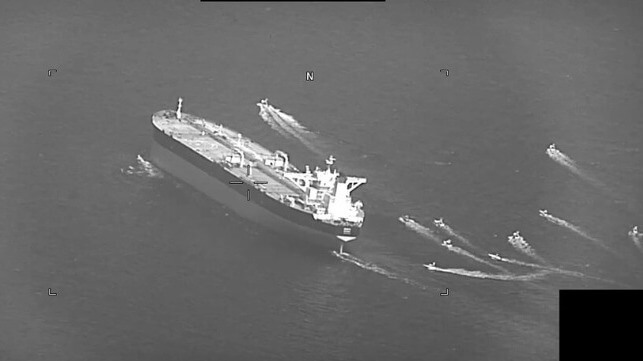WSJ: Texas Lightering Firms Too Scared of Iran to Touch Seized Cargo

In April, the U.S. government seized the tanker Suez Rajan after it was caught transferring sanctioned Iranian oil off Singapore. The ship and its cargo were dispatched on a 13,000-nautical-mile voyage to Houston, where the oil would be offloaded, sold, and the profits distributed to victims of terrorism. This sequence has played out scccessfully before - but this time, there is a hitch. All of the tanker lightering operators in the state of Texas are too scared to touch the cargo, according to the Wall Street Journal.
The problem starts with water depth. Suez Rajan's laden draft is too deep to reach any shore-based Gulf Coast import terminal without offloading part of the cargo. To get the oil to the refinery, cargo owner Houston Refining needs to lighter it off in smaller parcels using a shuttle tanker. That is proving nearly impossible, because all lightering operators have refused - for two reasons, according to the Wall Street Journal and S&P Global.
The first reason is the fear that the shuttle tanker's reputation will be tainted by its brief contact with Iranian cargo, even if that cargo is fully approved and authorized by the U.S. government. "The stigma of having touched a sanctioned entity's crude will be carried forever in the eyes of the rest of the world," one shipowner told S&P Global.
The second is that any shipowner who lighters the cargo off will have to watch over their shoulder for Iranian reprisals. Iran has developed a reputation for aggressively harassing, boarding and seizing foreign-flag tankers in the Gulf of Oman and the Strait of Hormuz, despite the extensive maritime security measures taken by the U.S. and its allies. The leading Gulf Coast lightering operators are global tanker companies, and they own ships that pass by Iran regularly. “Companies with any exposure whatsoever in the Persian Gulf are literally afraid to do it,” one energy executive told the Wall Street Journal.
As a result, the Suez Rajan and her cargo have been anchored off the coast of Texas since May 30, awaiting an owner brave enough to carry out the lightering operation. As of Wednesday, the vessel was still holding position.
The activist group United Against a Nuclear Iran (UANI), which first brought the Suez Rajan to the attention of American authorities, said that the case highlights the need for a more substantial U.S. naval presence in the Persian Gulf. With more destroyers and drones patrolling the Strait of Hormuz, the group argues, the Iranian threat would be reduced. "The U.S. cannot enforce oil smuggling sanctions if the shipping and related industry businesses live in fear of Iranian retaliation. Without real American deterrence, Iran can act with impunity to defeat even the best crafted sanctions laws," UANI CEO Amb. Mark D. Wallace told the Wall Street Journal.
No comments:
Post a Comment